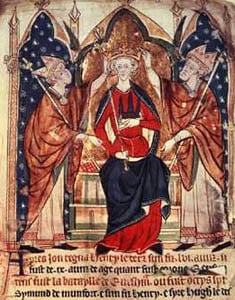On This Day: Coronation of Henry III
Posted on
On this day in 1216, a hasty coronation was held at Gloucester Cathedral. The country was at war, and a nine year old boy was the new King of England. It wasn't a great start for the new Henry III.
Civil War
King John had been an unpopular king for years, which eventually led to the signing of Magna Carta. This revolutionary document failed to maintain peace for long. As soon as he could, John repudiated the document, and the First Barons War became official. England descended in to chaos, with John and a few loyal supporters on one side, and a large number of the nobility and popular of England on the other side. The rebels were also supported by King Philip II of France, whose conquering of English possessions in France had started the problems. Seeing an opportunity to gain a new jewel in the French crown, he sent his son Prince Louis with his own army to assist the rebels, and hopefully claim the English throne.
Magna Carta had been signed in 1215. A year later, John was very ill, and fighting a lost cause. He had began a major offensive in September 1216, but rapidly lost his strength after contracting dysentery. He eventually reached Newark Castle in Nottinghamshire, where he died on 18th October. The story goes that he ate himself to death by gorging on peaches, but given that he was already seriously ill it's probable that it simply caught up with him.
Henry was only a boy, too young to be accompanying his father around the country. Instead he had been left in relatively safely with his mother, Isabella of Angouleme. His father's will had named William Marshal as his guardian, showing that while John might have been an idiot in some decisions, he knew who his friends were. Marshal had a reputation as one of the greatest knights in England, he was strong, intelligent, chivalrous, and while he may have disagreed with John in the past, he was utterly loyal to his king. Henry was in good hands.
Coronation
London was held by the rebellious barons and Prince Louis, so the traditional place of coronation, Westminster Abbey, couldn't be used. A coronation bestowed legitimate royal power on the King, so in order to strengthen Henry's claims against Louis, the ceremony needed to be held as quickly as possible. It was also hampered by the missing Archbishop of Canterbury, Stephen Langton, who had been banned from England by the Pope, until peace could be declared.
Henry was hastily taken to Gloucester, where he was crowned by an assortment of bishops, arranged by the papal legate to England. It's believed that King John had lost the crown jewels when crossing The Wash, as a result the reports of the time state that Henry had to be crowned using one of his mother' gold circlets. It wasn't the best start to a reign, but at least it gave England a new focal point. No one liked King John, but they disliked French influence even more. It soon became clear that there couldn't be an outright winner.
Future Reign
Henry would also go on to have his problems with his nobles. Louis was eventually defeated by William Marshall, and agreed to leave England once a large sum of money was offered to him. In the future, Louis' son and Henry would both marry daughters of the Count of Provence, and the French court would support Henry in his own fights against the Barons. After this inauspicious start, a second coronation was held for Henry in 1220, with permission granted by the Pope, with a newly created crown and a recently returned Archbishop of Canterbury.
Although this was the first "emergency" coronation held for an English king who was still a minor, it wasn't the last. Henry's great-grandson, Edward III, would also one day have to endure a rushed ceremony thanks to political problems.
(If you're a fan of Henry III, you can find his badge!)